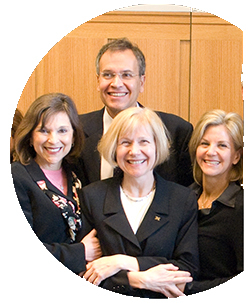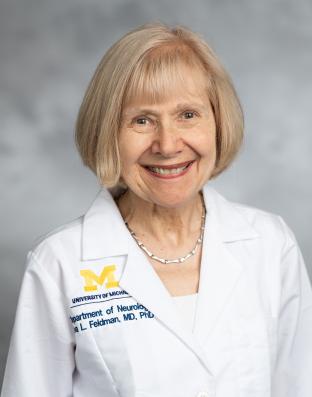Working across international boundaries, Dr. Eva Feldman, director of the NeuroNetwork for Emerging Therapies at Michigan Medicine, has created a partnership in ALS research with Dr. Benjamin Reubinoff, Chairman of the Department of Obstetrics and Gynecology at Hadassah University Medical Center in Israel. He is also Director of the Sidney and Judy Swartz Embryonic Stem Cell Research Center and an affiliate member of the NeuroNetwork for Emerging Therapies.

In collaboration with lead author Dr. Anastasya Birger, Drs. Feldman and Reubinoff published their findings in EBioMedicine. They report that damage caused by ALS doesn’t just affect motor neurons but also affects astrocytes, the cells that support and nurture neurons. This work identifies new targets for developing treatments for ALS patients.
“This was a great collaborative effort, which drew Dr. Feldman’s experience in ALS with our experience in stem cell differentiation,” said Dr. Reubinoff. “Our results suggest that astrocyte dysfunction in ALS increases their oxidative stress and that of motor neurons, and probably contributes to neurodegeneration. Our findings also support the importance of developing therapeutic strategies for ALS that target astrocytes as well as motor neurons. There are currently ongoing clinical trials testing the therapeutic effect of injecting ALS patients with healthy astrocytes or astrocyte-like cells. Our study support the approach adopted by these clinical trials.”
“Understanding the molecular and cellular pathways of ALS progression will help us develop mechanism-based therapies,” agreed Dr. Feldman. “There is currently no cure for ALS, so new therapies are urgently needed. This work is an example of how our newly-formed NeuroNetwork for Emerging Therapies will achieve its goal of alleviating suffering in neurological diseases. Scientific discoveries like this require collaboration that spans disciplines, institutions, and even geographical boundaries. I’m very excited about our continued ALS research with Dr. Reubinoff.”
In the study, Birger et al. sought to understand how astrocytes contribute to ALS progression. ALS causes degeneration of motor neurons, which control muscles; however, ALS is not “cell autonomous,” meaning that motor neurons are not the only cells participating in or affected by the illness. Many other cell types have been implicated in disease progression, such as astrocytes, the focus of this study.
“Dr. Feldman has developed a large repository of donated primary cells from non-inherited sporadic and inherited familial ALS patients,” explained Dr. Reubinoff. “These cells are genetically characterized for mutations associated with ALS, including expansions to C9orf72, which was of interest to this study, and are crucial in our question to understand the pathogenesis of ALS.”
The researchers obtained skin cells donated to the University of Michigan ALS Patient Repository from healthy individuals and from ALS patients with the mutated gene C9orf72, the most frequently mutated ALS gene. The skin cells were then “reprogrammed” into astrocytes using pluripotent stem cells (iPSCs).
Data from this study led to three key revelations:
- Astrocytes derived from C9orf72 ALS patients were significantly more toxic to mouse cortical neurons and human embryonic stem cell-derived motor neurons than those from healthy individuals.
- Study of RNA revealed that ALS C9orf72 astrocytes were more likely to die than those from the healthy patients.
- C9orf72 astrocytes released less anti-oxidant proteins, which were less capable of fighting harmful reactive oxygen species (ROS). Indeed, C9orf72 astrocytes had higher ROS levels and, when added to motor neurons, did not prevent ROS buildup or oxidative stress in motor neurons.
In addition to oxidative stress, Dr. Feldman and her research team are also pursuing inflammation and the role of the immune system in ALS progression, as well as the “exposome,” the cumulative effect of exposure to harmful toxins.

Eva Feldman, MD, PhD

